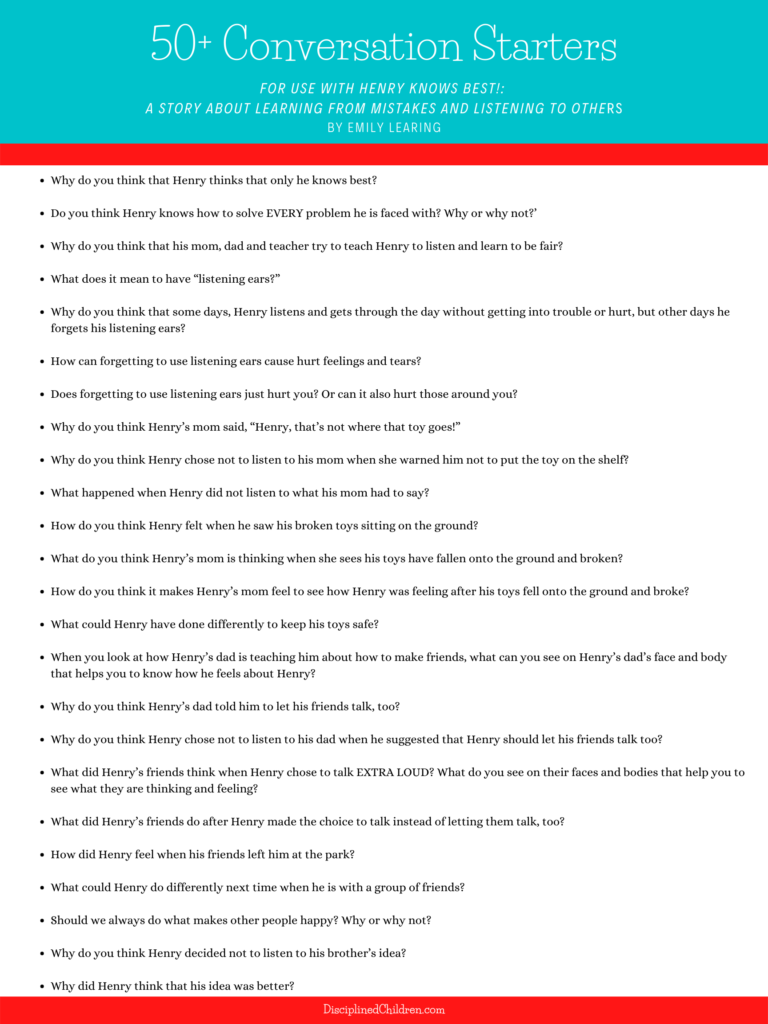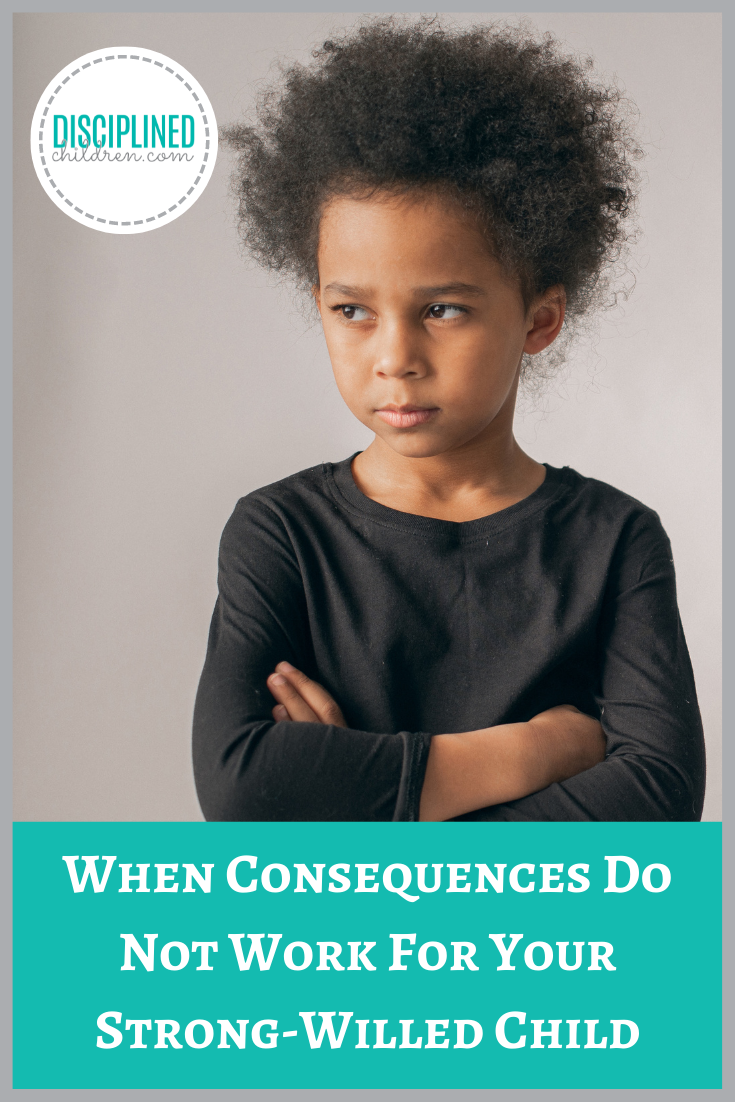A very frustrating things for parents of strong-willed children is when they find a consequence that seems to make sense for their child’s behavior, but their child vehemently reminds them that the consequence had no impact whatsoever on them.
Actually, some kids go as far to say a big “thank you” to their parents for a consequence, just to make sure that parents know that it did not have its intended effect on them.
This reaction sends parents back to the dreaded drawing board to find the right response to behavior that can lead to the type of life that parents dream of for their kid.
Not the “I’m the adult…you need to listen to me” kind of life but the “I’m your mom and I’m really worried about how you’ll navigate life successfully with this strong-willed attitude” kind of life.
It can be EXHAUSTING trying to find the exact right consequence that impacts your strong-willed child’s behavior, just to find out that it works for a day, or maybe even a week before your child reminds you that it has zero impact on them whatsoever.
What is a parent supposed to do? Aren’t consequences supposed to lead to lifelong lessons?
One of my favorite parts of my job is to be able to get a front row seat at how kids view the world.
Some kids tell me the same thing that they tell their parents: “I don’t care…they can take my tablet. I don’t like it anyway!”
And some kids tell me the truth…that they really do care but there is no way that they are EVER going to let their parents know this!
The truth is that consequences, while valuable for teaching life lessons to children and teens, are truly only one part of the equation.
You may find that a consequence has a lasting impact on one of your kids and seems to make the behavior of another one of your children worse.
Each kid is so different and reacts to consequences in completely different ways.
Which means that if you want to be effective in teaching your strong-willed child right from wrong, your approach may need to have more to it than just sticking to a choices-consequences routine.
In this post, I will share some tips with you to assist in selecting and implementing the appropriate consequences for your child, as well as look into other ways to teach the lessons that you’re hoping to teach, without ever having to threaten or dole out a consequence for your strong-willed child.
Choosing the Appropriate Consequence for Your Strong-Willed Child
Our natural tendency as adults is to make consequences feel negative in some way. Your child made a poor choice and now a negative consequence must follow to help him to see the error of his ways. Period.
But consequences—especially for strong-willed children—don’t always have that impact.
We all know that we could get a speeding ticket, but some of us are willing to take that risk.
We all know that eating too much sugar is bad for our health and that we’ll regret it later, yet most of us know exactly how this misery feels following a holiday, party or maybe even a Saturday night!
We all know that being kind and respectful is the best way to talk to someone we care about, yet most of us also know the feeling of regret when emotions get the best of us and we say things to our partner or kids that we didn’t mean to say in the moment.
Sure, consequences show us the positive and negative impact of our choices, but there are many other factors that go into whether we allow consequences to guide our day-to-day behavior.
And for strong-willed children, this is even more significant.
A strong-willed child is strategic and methodical about the ways in which they choose to behave.
When I say this, I am not insinuating that they are manipulative. This is actually a misconception of strong-willed children, that they are always trying to make things as difficult as possible for others.
In reality, strong-willed children are inquisitive and interested in calculating and analyzing the pros and cons of the situation.
A consequence—positive or negative—has a certain value to it. And so does every other experience in the world.
When making a decision about whether to comply with your direction or face the consequences, your strong-willed child is going to think about all of the positives and negatives associated with a situation and do a thorough assessment of what brings him the most value.
If going against your rule or request coupled with the consequence has more value to it than complying, your strong-willed child is going to choose to accept the consequence offered.
If your child has a need that is not being met, or that she thinks might be met by going through with her choice, a consequence aimed at eliminating that behavior may not have as much impact as the need itself.
When choosing consequences, I first encourage parents to think of the meaning behind the behavior.
For example, is your child:
- Wanting more control?
- Desiring attention?
- Desiring more connection?
- Meeting a sensory need?
- Trying to get you to feel the way he does?
If any of these are true of your child’s behavior, no amount of removing screen time, taking a time out, missing out on a fun event or doing an extra chore will result in the outcome you are looking for.
A child who wants more control needs more control. If a consequence takes away her control, she seeks out more of it and behaviors can actually worsen.
A child who wants more attention may use behaviors to seek out attention. If the consequence offered puts more distance between a child and his parent(s), the behavior may continue or worsen.
A child who is seeking more connection with a parent may accidentally use behaviors that push parents further away from her. If his parent responds with consequences that disconnect them, the behaviors can worsen.
A child who has a sensory need will behave in ways that meet that sensory need first. A consequence such as a time out might only intensify her unmet need and worsen the behavior.
A child who feels like the world won’t let him have a say in anything may repeat that pattern right back to his parents. When parents recognize the socially inappropriate aspect of his choice to try to control things and try to stop it, the child feels unheard and that adults can do things that he is not allowed to do. His attempts to show others how he feels might intensify until his parents better understand his feelings.
Providing the Consequences Your Child Needs
When you think about it from this perspective, it becomes clearer why your child may refuse to admit that a consequence impacts her, or why you don’t see any change to her behavior after giving a consequence.
When choosing consequences for your child, think about these underlying factors to understand where your child is coming from.
Is your child seeking attention from you? If so, giving your child a time-out after the behavior might not be the best way to respond. Instead, possibly ignoring the misbehavior so as not to give any attention to the negative, and then connecting with her as soon as the behavior stops to show her that you love her no matter what choice she made might b the best way to meet her need for attention.
This may be easier said than done, as parents also can have a difficult time wanting to connect with their child after misbehavior, especially if the behavior is frequent. It may be tempting during this type of interaction to separate from your child out of frustration, but this might be the opposite of what your child needs.
To do this, parents have to fight their initial urge to offer their time and attention as a consequence (“You’ve upset me so now I need some space from you.”) and instead offer it as encouragement to their child (“You’ve upset me, but I will always love you and want to be with you no matter what you do in your life.”)
If you need help with this, I suggest The Love Explosion Technique, part of my free guide.
Is your child seeking more control in his life? Does he feel like parents, teachers and other adults dictate his every day and he never has a chance to do what he wants to do?
If so, pushing a consequence on him that makes him feel like he has less control over the world is just going to worsen things.
Instead, a better solution may be to recognize that need for control and to implement more opportunities for him to be in charge:
- Helping to plan meals,
- Having a say in the weekend schedule, even if that means staying at home and playing with the toys he misses so much during the week when he has to go to daycare or school,
- Choosing his own clothes (whether they match or not),
- Choosing the order of his daily routine , or
- Choosing activities for family fun night (and maybe even letting him make up his own set of rules that the family can follow together)
When you start to give out consequences based upon your child’s needs and not just focused on providing a negative consequence to deter undesired behavior, you may start to see more success in the way that your child responds to consequences.
Teaching Life Lessons without Consequences
Let’s be honest, none of us enjoys being told about the error of our ways, the consequences of our actions or the changes that we should make to become a better person.
While we all need to hear it sometimes, no one really enjoys this experience.
Adults and kids alike have some difficulty with taking accountability for their actions and being willing to admit to deficits that need to be improved.
So, while consequences are a helpful way to teach valuable life lessons, they do not have to be your only way.
If you have signed up for my newsletter, you already have access to 9 techniques that parents can use to help encourage strong-willed children to be more cooperative.
In that handout you will find the Preview Technique that can help your child to identify choices and consequences, without actually having to provide those consequences to your child.
This technique also includes an option to preview the consequences that result from the choices of others.
I appreciate opportunities that teach positive life lessons without harping on kids for their negative behavior, especially for strong-willed children.
Because of their personality, strong-willed children are very used to adults telling them negative things about their daily life choices, so any opportunity I can find to address this in a more positive and preventative way is going to be my first option.
One way that I love to help teach positive skills without focusing on the negatives of a child’s behavior is to utilize characters in books, videos and TV shows to help teach life skills.
I realize though that not all of you are early childhood therapists and this might not exactly come naturally to you (just as technical skills of many of your careers do not come naturally to me).
To assist you in helping your child to get the most out of their experience with books, videos and TV shows, I have created a handout for you with 50+ Conversation Starters for Henry Knows Best!

Click the link above to access a PDF copy of 50+ Conversation Starters For Use with Henry Knows Best!
While this list has been created to use with Henry Knows Best! this list also demonstrates how parents can take the information from a book or video and start a meaningful conversation about what this scene is attempting to teach to children.
As you look at the questions on the list, notice how the focus is on a variety of topics, including:
- How actions affect others,
- How actions affect himself,
- When it is appropriate to do as others ask, and more importantly, when it is NOT appropriate to do as others ask,
- How parents feel about their children, regardless of what choices their children make, and
- Options for making better decisions in the future
The last thing parents want to do is teach the lesson of “do as you are asked” to the detriment of respecting our internal gauge or thought processes that help us to analyze right from wrong.
When talking with strong-willed children about the choices that characters make, I encourage parents to talk about a variety of topics, from social skills to self-advocacy, to the reasons why or why not something happened, to help kids to hone their skills in problem-solving, decision-making and social interaction, instead of teaching the blanket message of “do it because I asked you to.”
If you do not currently have a copy of Henry Knows Best! and want to get one so that you can see how these conversation starters were formed from the scenes of the book, you can head over to the Henry Knows Best! section of the site to select your favorite book retailer.
As a parent of a strong-willed child, I bet you’re thinking,
“Yeah, but my kid is strong-willed and when I ask him those types of questions, he’s just going to ignore me or refuse to answer.”
And you would be correct. At times, your strong-willed child is going to ignore you, demand that you move on or insist that you stop asking that question.
In those moments, it’s important for us as parents to know that raising a child is a process, not a destination. Some days will be difficult, but some will be better. And each interaction you have with you child is just one step on the journey.
Another fun part of my job is hearing a child share how they used something taught to them by their parents, me or another helper and (to their surprise) that it actually worked!
Parents are often totally surprised to hear that their child used that piece of advice, because they either appeared to not be listening at all or fought that suggestion with a fierce resistance when it was offered!
But yet, they still heard it AND used it somehow!
In those situations, I try not to overreact and tell them that I knew that it would work all along, because truly, they wanted to figure it out on their own. I know that their parent has a lot of information to share to help them; but until the strong-willed child understands that, it doesn’t really matter what I think.
Instead of an emotional “I told you so!”, I say, “Your mom had some advice, you tried it and it ended up working out really well for you.”
This makes it their decision to have chosen to listen to and implement their mom’s advice and to ultimately have achieved the outcome on their own.
And that, truly, is what this job of raising children is all about, right? One of our goals is to help them to learn how to make the right decisions in life no matter how many voices are trying to get them to go in the opposite direction, because we know that so many conflicting voices will be present throughout their life.
Today, we are working on teaching them which voices to trust and how to develop their inner voice to be a strong, reliable voice to listen to, so that tomorrow they will know what to do when we are not there to help them.
Easy, right? Well not so much.
But if you keep showing up like you’ve been, keep trying to respectfully guide your strong-willed child into the fine human you know they can be and keep turning to support for yourself as a parent of a strong-willed child, you will come to learn that once you get through these days, you’ll be proud beyond belief of who your strong-willed child turned out to be!












Leave a Comment